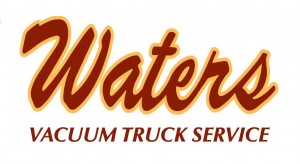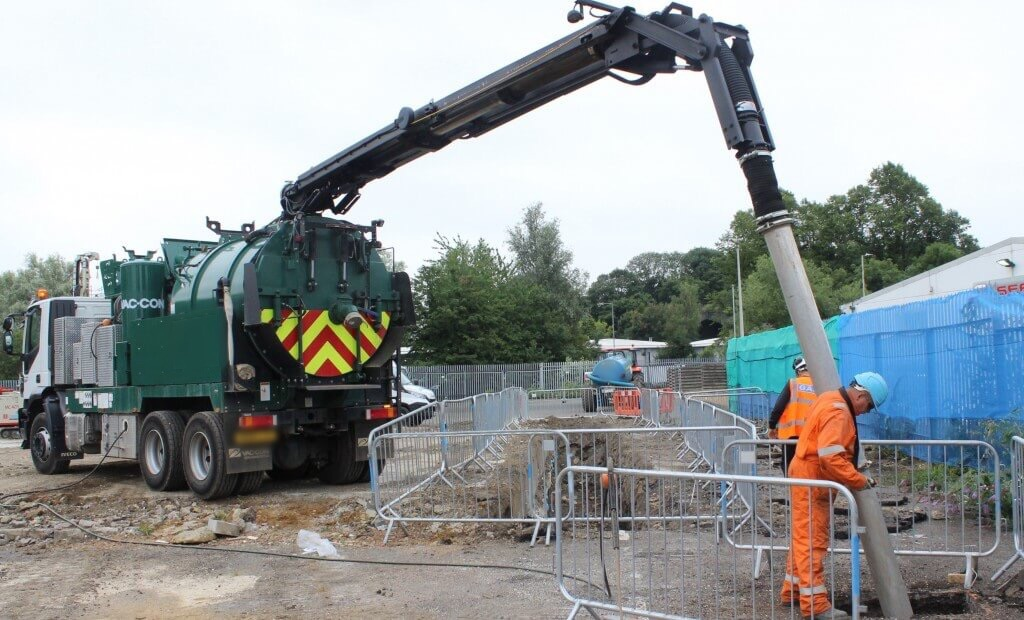Hydro & Compressed Air Excavation: A Safer Alternative to Traditional Excavating
Vacuum Excavation is defined as soil extraction using a high-powered vacuum truck and either pressurized water or air to break apart and remove said soil. The use of water during vacuum excavation is typically referred to as Hydro Excavation, while the use of air is commonly called Compressed Air Excavation. These particular methods of excavation are commonly accepted as being the equivalent or safer than hand digging within the tolerance zone around underground utilities.
The use of Vacuum Excavation equipment allows for safe exposing of buried utilities as well as removal of soil for other related purposes. This process enables workers on-site to stay safe on the surface above the excavation point and helps to eliminate/minimize accidental damage to utilities and trench cave-ins. Waters Vacuum Truck Service offers both Hydro and Compressed Air Excavation services to various locations within the Northern Nevada and Northeastern California region.
Hydro Excavation – Safer Digging Utilizing High-Pressure Water and Vacuum Truck
Hydro Excavation uses water to loosen the soil and facilitate digging. The use of high-pressure water helps to break-up soil adhesion so that a vacuum truck can easily suction material out. A vacuum truck is used in conjunction with the water to remove and collect wet, muddy soil for off-hauling and disposal. Below are the main benefits of hydro excavation vs. traditional excavation.
- Greater precision, allowing for smaller work area and less mess
- Less invasive than traditional excavation equipment and methods
- Utilizes less manpower and equipment compared to traditional excavation
- Safer to surrounding utilities eliminating damage and costly repairs
Compressed Air Excavation – The Industry Gold Standard for Digging & Utility Excavation
Compressed Air Excavation utilizes compressed air and a high-powered vacuum truck to loosen dirt and soil for quick removal. This process has several advantages compared to traditional digging methods as well as Hydro Excavating. Below are the main advantages of Compressed Air Excavating.
- Helps eliminate damage to the utilities
- No need to off-haul excess excavation material and charge costly disposal fees (vs. Hydro Excavation)
- Can be used on a variety of utilities and conduit (gas, water, power, etc.)
- Compact work area with less disruption and cleaner work site
- Air does not need refilling (vs. water used during Hydro-Excavation)
Please call Waters today at (775) 825-1595 or CONTACT US to inquire on pricing and availability of Hydro and Compressed Air Excavating equipment.






It seems really handy that excavating contractors who use air excavation methods are good because they can quickly get rid of material. Being able to remove things without trouble would be handy because it would mean that you don’t have to worry about any buildup. If there wasn’t any buildup the job site would stay tidy and easy to take care of.
It’s good to know that hydro excavation is able to keep the work area focused and small by just excavating what needs to be excavated without making a mess. We’re going to need to fix some utility pipes going to our house through our front yard, but we just landscaped it this last summer. Maybe using more precise excavation methods could keep more of our yard intact.
It’s good to know that buried utilities can be easily found excavated using a vacuum truck. I think this would be perfect for trying to uncover underground pipes. If a pipe were to break but it was too far down to check then they could vacuum out all the dirt and reach it easily.
I’m glad to see that hydro-excavation is safer because it uses high-pressure water. That sounds like it makes less of a mess too. So I’ll see what I can do about hiring a contractor to do this.
The fastest and safest way to excavate a large amount of material (such as a basement, sub-basement, or concrete foundation) is with a hydraulic or compressed air-driven auger. Hydro and compressed air excavation can take place all year round, even in the extreme cold of winter. It means that when you dig, you work at all times of the year, anywhere, as long as you have access to the required equipment and an open trench.